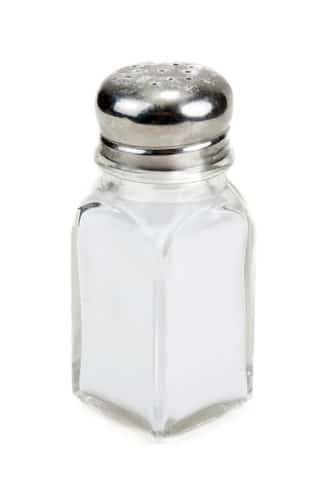
What’s in Salt Substitutes?
Salt substitutes are made of potassium chloride rather than sodium chloride. Potassium won’t elevate your blood pressure like sodium potentially can, and it won’t cause bloating. In fact, potassium may help to reduce blood pressure and bloating. For most people, potassium chloride salts are a safe substitute for sodium chloride salts. The exception would people who have kidney disease since they can’t excrete potassium as easily and are at risk for high potassium blood levels. Also, people taking certain types of blood pressure medications should avoid potassium-based salts since some of these medications cause the body to hold on to potassium.
Unfortunately, potassium chloride doesn’t truly taste like salt. It has a slightly bitter aftertaste, which some people tolerate in the name of getting their “salt fix.” A more palatable option from a taste standpoint are light salts that typically have 25% less sodium. They contain potassium chloride but smaller amounts of it so they don’t leave the same aftertaste.
Other Ways to Reduce Sodium in Your Diet
Salt substitutes are a safe option if you don’t have kidney disease and aren’t taking medications that cause your body to retain potassium, but a healthier way to add flavor to foods is with spices and herbs like turmeric, cumin, smoked paprika, curry, basil, onion powder, garlic, rosemary, cinnamon and a host of other salt-free options. Many of these spices have health benefits. For example, curry and turmeric reduce inflammation and cinnamon helps to regulate blood sugar. Rosemary and oregano are two of the strongest anti-oxidant spices in the spice cabinet. Spices boost flavor without adding sodium.
The other way to reduce dietary sodium is to eliminate processed and packaged foods. If you can’t eliminate them completely, check the sodium content before buying them. Some packaged foods you wouldn’t suspect are high in sodium. Processed meats, breakfast cereal, cottage cheese, salad dressing, soups, sun-dried tomatoes, condiments, snack foods, and even bread are often high in sodium. Make it a habit to check the sodium content on everything you buy. The American Heart Association recommends keeping daily sodium intake to no more than 1,500 milligrams a day if you have high blood pressure or are at high risk for heart disease. Everyone else should aim for no more than 2,300 milligrams daily. That’s about a teaspoon of salt.
Packaged foods aren’t the only culprit. Most restaurants use generous amounts of salt to season their food and make it more palatable. A meal at a restaurant or a fast-food restaurant could easily surpass your sodium requirements for the day. Avoid fast-food restaurants, and if you eat at sit-down restaurants, tell the chef to hold the salt. Be wary of soups and appetizers. They’re usually loaded with sodium.
The Bottom Line?
Salt substitutes are safe for most people, and they can be a healthier option to table salt. On the other hand, you’ll get more health benefits by using spices to flavor your food – or even lemon juice or flavored chutneys. Experiment with these options and you may not need a salt substitute.
References:
American Heart Association website.
Related Articles By Cathe:
Too Much Sodium in Your Diet? It May Not Be the Foods You Expect

